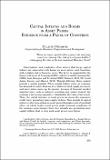Artículo
Capital inflows and books in asset prices: evidence from a panel of countries
Fecha
2014Resumen
Policymakers and academics often believe that large capital inflows are associated with booms in asset prices and therefore with a higher risk of financial crisis. The belief is supported by the theoretical works of Krugman (1998) Caballero and Krishnamurthy (2006) Aoki Benigno and Kiyotaki (2009) Korinek (2010 2011) and Adam Kuang and Marcet (2011). Though different these models provide a simple parable. When capital inflows enter an economy the demand for assets that are at a relatively fixed supply increases and asset prices move up. In general because of financial market imperfections such as adverse selection and moral hazard the economy’s borrowing capability is limited by the value of its assets. Thus the initial increase in asset prices increases the economy’s credit limit promoting more capital inflows. New rounds of capital inflows evolve into a boom in asset prices through a sort of snowball effect in which higher asset prices make financial conditions of the economy seem sounder than they actually are promoting more capital inflows that in turn push asset prices even higher.
Colecciones
Descargar


